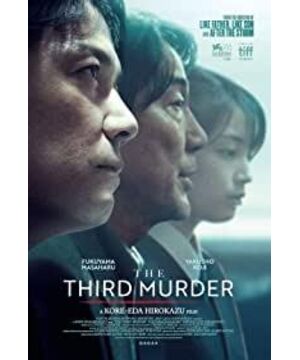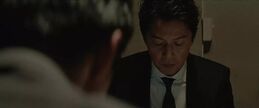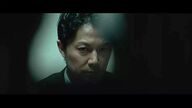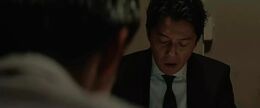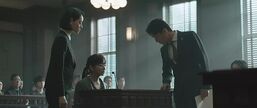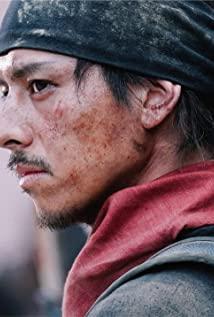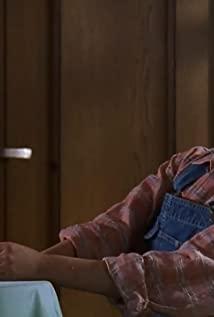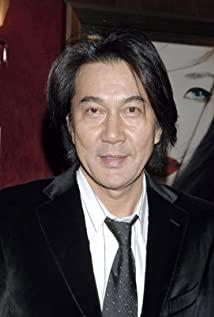After all, this is Hirokazu Kore-eda's first movie in Chinese theaters, and I'm still very excited to see it on the big screen.
In the past, I liked Hirokazu Koreeda, because I was used to his calmness and calmness, the affection between people in the family unit, with a keen and real observation of family and society, with a witty sense of humor, those characters in the play, it seems Repeatedly narrates the details of his own growth, but going around is inseparable from the fetters of family affection.
However, this time, unlike the previous family films such as "Walking", "The Way Home", "Father Like Son", "Sea Street Diary", and "Deeper than the Sea", it was Hirokazu Koreeda who left his long-standing comfort. District, into the field of suspense themes, bringing a dark story about murder, sexual assault and court trials. Some people say that this is a rare transformation of Hirokazu Koreeda, but in fact this film is the shadow of his early works.
It was Hirokazu Koreeda who first started filming documentaries at TV Man Union for a long time, and participated in many documentary works with social topics. The concern for society has planted the seeds in his body since then.
Later, he filmed "Distance", which was based on the case of the cult organization "Aum Shinrikyo" poisoning tap water in Tokyo. Another award-winning masterpiece "Nobody Knows" was also the subject of the Tokyo Nishi Suga duck abandonment incident that caused a sensation in Japan in the 1980s. Impact. Although these stories do not have the heaviness and darkness that comes from facing them directly, they are more contemporary and depressing works compared to his later family films with light techniques and gentle emotions.
Therefore, rather than saying that "The Third Suspect" is a transformational work, it is better to say that it is a return to the basics of Hirokazu Koreeda, returning to the state of the past in terms of the depth of the story and the sensitivity to society.
Anti-suspense, anti-climax
The film revolves around a murder and burning corpse case committed by Misumi, played by Yakusho Koji. Sanyu has a criminal record, a former inmate who had been in prison for 30 years, so his second crime was advocated by the prosecution to impose the death penalty. You must know that although Japan has not yet abolished the death penalty, the sentence of death penalty is often cautious, and most of the time, the death penalty will be replaced by life. In the eyes of others, Sanyu's behavior was undoubtedly a heinous crime.
Shigemori, a lawyer played by Masaharu Fukuyama, joined Sanyu's defense team in the middle of the trial to ease the sentence. But as Chongsheng gets deeper and deeper into the case, has more and more information, and becomes more and more familiar with Sanyu, the murder case has become more complicated.
Although "The Third Suspect" has many elements of commercial suspense films, it is an out-and-out anti-suspense suspense film. The film retains the literary style of Hirokazu Koreeda, the rhythm is quiet and slow, the lines are intriguing, and the plot is full of anti-type and anti-climax.
Most of the suspense film routines we are familiar with in the past are mostly in the uncertain state of the case full of unknowns. The story helps the audience to eliminate useless and false information little by little in the complicated and chaotic clues, and finally points to a sound and clear ending. The story of "The Third Suspect" is more like a reverse process of traditional reasoning films.
In the first scene of the movie, the whole story of Hiroji's murder is projected on the big screen without any cover. But after lawyer Shigemori intervened, more clues gradually surfaced. For example, the deceased's wife concealed the fact that her husband's factory was cheating. In a moment of confession, he showed his attitude that he never murdered...
This information is intertwined and intertwined, forming a Rashomon-like complex situation, and making the truth of the case more and more confusing.
In "The Third Suspect", Misumi and Shigemori used seven dialogues of progressive, offensive and defensive transitions to create an anti-climax that seemed to be a climax. But the result finally stopped on ambiguity, and the good and evil of Sanyu's motives became a mystery.
there is no truth at all
The truth is the ultimate goal of suspense films, and in "The Third Suspect", it has become a cunning concept. Or, in fact, there is no truth at all.
In the movie, lawyer Shige Sheng's attitude towards the truth also undergoes an important change. In the beginning, Shigemori only wanted to mitigate the crime of the suspect and didn't care about the truth. When he met the prosecution for the first time, the prosecutor's lawyer said: Blindly commuting prisoners' sentences makes them unable to face the truth. Hearing the word truth, Shigesheng smiled contemptuously. At this time, the truth has no weight for him, just like what he said when educating the younger generation: it is not to make friends with criminals, there is no need for understanding and resonance, everything is for defense.
Since defense is the highest purpose of action, why does it matter what the truth is?
But after getting more clues and evidence, and constantly changing his testimony in Sanyu, Shigesheng gradually began to crave the truth and became paranoid. He became every audience member off-screen, and as he was surrounded by layers of cloud-shrouded mysteries, his desire for the truth became increasingly difficult to restrain. At this time, when he patted the glass of the visiting room and shouted, "Please, you must tell me the truth this time", what occupied him was the helplessness of wanting to know the truth.
The truth is like the elephant in the "Blind Man Touching the Elephant" mentioned in the film. People can only see the facts that they can see. No matter how many pieces they pick up, they cannot be pieced together completely. The truth is always a residual picture.
Whether it is the truth of the unresolved case or the question of the trial of people, the film does not give a clear result at the end. Because the truth doesn't exist.
It was Hirokazu Kore-eda who did not pre-set the answer before shooting, but was exploring the results of these questions during the shooting process. Therefore, there is no clear position and preconceived notions in the film. Instead, questions are constantly being asked through the character of Sanyu.
The film's current title is "The Third Suspect", but a more appropriate way of saying it would be: "The Third Killing." The first and second murders can refer to the murder committed by Misumi 30 years ago, as well as the murder and burning of the body at the beginning of the movie. In the third murder, the law killed Sanyu, or in other words, the truth was killed.
Is there something wrong with the judicial system?
So, who killed it when the truth happened? Here, it is Hirokazu Kore-eda who throws out his sharpest question in the film - his speculation on the law.
In the movie, the judiciary is portrayed as an existence that overrides the truth. No matter what the truth is, such a socially sensational case is only an indicator of performance evaluation in the eyes of judges, and it is only a different position in the eyes of lawyers.
In the past, when filming "Like Father Like Son", it was Hirokazu Koreeda who mentioned that many lawyers he came into contact with told him that the court in reality is not a place to seek the truth, but a place to judge people.
And "The Third Degree Suspect" stems from a question in his heart: what is it about people judging people, can people judge people?
Judging from the movie, the judgment of man on man is omnipresent. Misumi had asked Shigemori a question, whether he believed that there were people in the world who should not be born. When Shigemori was controlled by his sensibility and impulsively said that the deceased was still alive, he became a judge with a gavel in his hand. Even when Shigesheng was helping Sanyu debate, he also asked himself and answered: Are he saving or punishing Sanyu now? Salvation and punishment, two words with obvious motives of good and evil, have also gone through the process of judgment in advance.
Is there something wrong with the judicial system? Actually the feeling after watching this movie is that it's not just the law, it's the world that is broken.
I don't even know who the killer is
It is a common family bond in Hirokazu-eda's works, and it is also a crucial existence in "The Third Suspect". The fatherhood of Misumi and Shigemori, as well as the identity of Sakie's daughter, more or less guide the direction of the case, even For a time, Shigesheng was more and more controlled by sensibility.
But compared with the director's previous works, the family relationship in the film is also flawed, but it does not give a warm ending towards reconciliation. Until the end, the family relationship in "The Third Suspect" was completely broken: Sanyu's daughter never forgave the murderer's father; Shigemori could only express his concern in the face of his adolescent daughter's call: And Sakure's injuries have not received any compensation and care.
Sanyu is the most complex character in the film, but it is also called an empty container. In different dialogues, Yakusuo Hiroji endowed Sanyu with different character dimensions, like a lake that can't be seen to the end, ambiguous, sometimes peaceful and weak, sometimes cunning and crazy, no matter what people can't see the bottom of the lake real situation.
Koji Yakusho is like the empty container that Mitsugu was described as. He revealed that he would completely believe in this character every time he performed, and every time he felt that what he said was right - through his transparent appearance, Sheng Jin Three corners of the world. And Hiroshi Yakusho's strong acting skills also won him the best supporting actor at the Japan Film Academy last year.
When it was Hirokazu Koreeda that was producing "The Third Suspect", he was still the same as when he was filming the previous work. Most of the characters' confusion about the murderer and the case comes from the real emotions of the actors in reality. Masaharu Fukuyama, who played Shigemori, didn't know if Misumi was the real murderer at the time of filming.
It was Hirokazu Koreeda who once said in an interview: "If there are some things I have decided in advance, I will go with my ideas, but instead of forcing others to do these things, it is better for me to be with the actors, myself, and the screenwriter. Shooting the scene to find the right answer."
But this is what we are familiar with is Hirokazu Kore-eda. His films are sensitive to family and society, but they always stop before being sharp. He once said: "There has never been such a person in my works that makes people feel that it is better not to be born. It is true that my works are gentle and not sharp, and I myself have the same intention."
After all, "blindly showing the bad things behind people is not the same as digging the depth of human nature." So we can often see some blunt edges and corners from the gentleness of his works, just like "Nobody Knows" The daily fun and light-hearted soundtracks that cover the bitter essence of life.
This is probably the undercurrent surging beneath the calm surface of the sea that Hirokazu Kore-eda wanted to photograph. Whether it is the delicate family relationship or the speculation related to the society, Hirokazu Kore-eda turned them into a smoldering fire, which makes people feel as if they are constantly being pulled by an inertial force after they put them down.
View more about The Third Murder reviews


